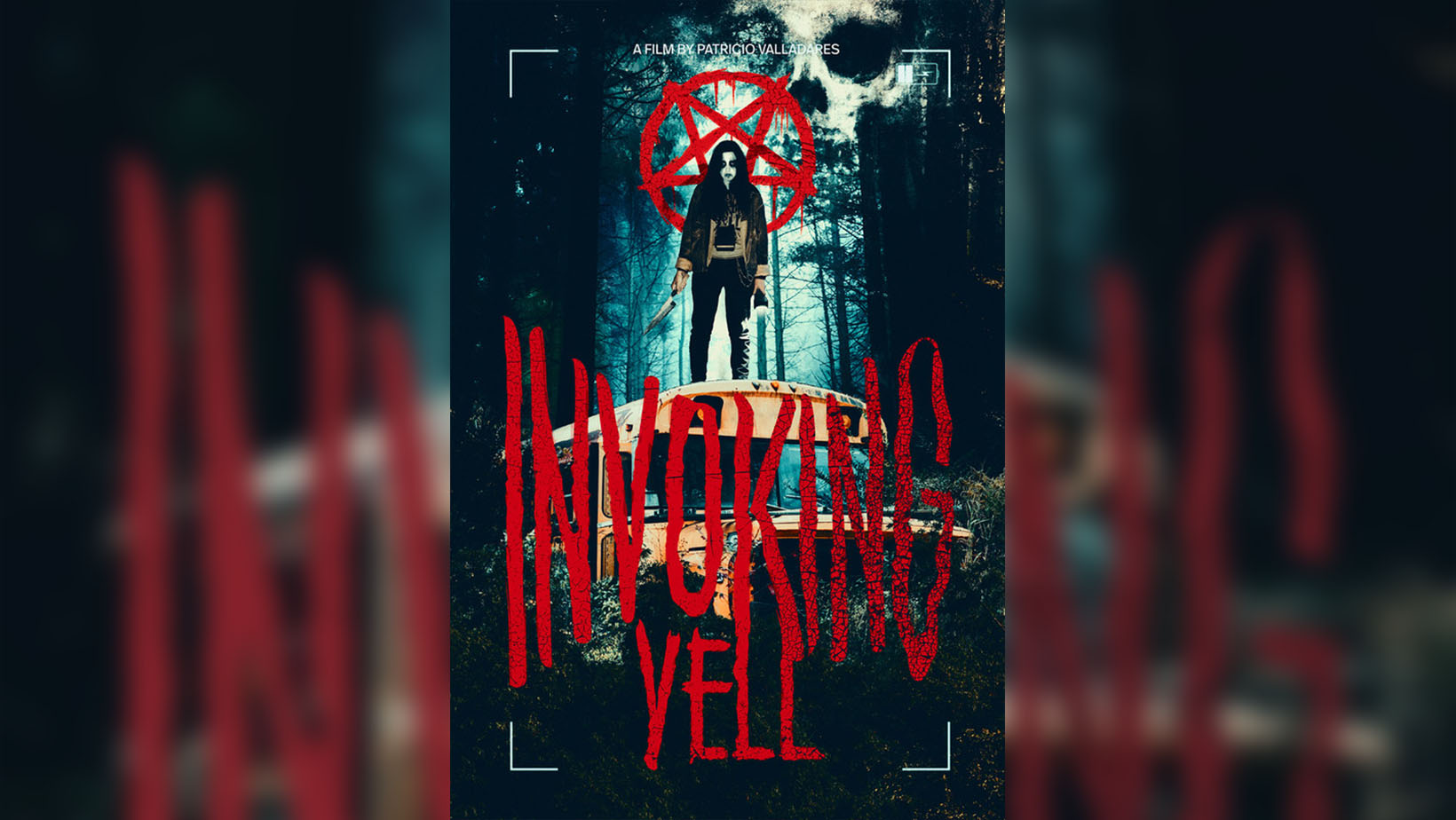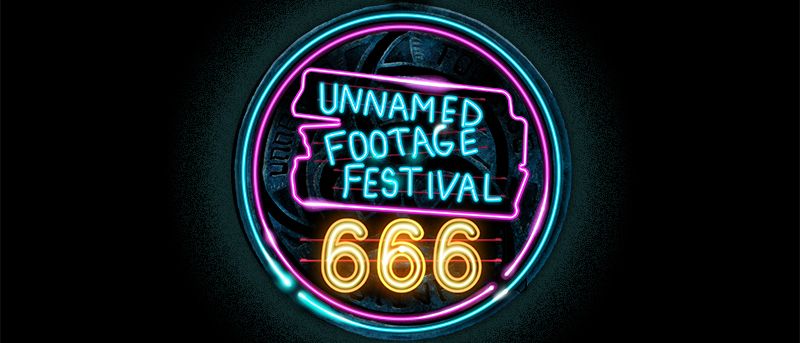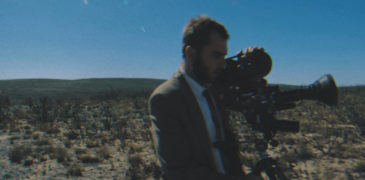
Self-described as a metalhead for life, Chilean filmmaker Patricio Valladares makes some noise in this year’s version of Unnamed Footage Festival. Taking place in San Francisco, this event is proud to showcase subversive films that explore the found footage format and Valladares’ Invoking Yell (2023) is one of them. By mixing black metal, interpersonal conflict, and psychophony, it seems this film has the perfect recipe for an interesting story. However, that does not always ensure a spectacular result. Does Invoking Yell deliver or end up being nothing but a whimper? The truth is that outcome might not be perfect, but neither is the worst. In fact, it can be worth watching for those looking for films with some unexpected potential.
The film tells the story of three metalheads, Andrea, Ruth, and Tania, going into the woods to record psycophonic sounds from a place where dozens of children died in a bus accident in Chillan, south of Chile. Their motivation behind this excursion is to record samples for their band: Invoking Yell. From the beginning, it is clear there is a long way to go until they become known as the first local all-female black metal band. Despite having tons of ideas, they only have an unfinished demo, but they are confident that by adding this supernatural twist, they will break it into the genre’s scene.

However, it is easier to be said than done. It is clear that while Tania is carefree and cheerful, Andrea is too intense and fame-focused, almost to the point of being comical. The latter hates the fact that they invited had to invite the newcomer and supposed poser Ruth to tag along. Despite her eagerness to become a member of Invoking Yell, it is obvious that Ruth is part of the project only because she can offer resources like cameras, transportation, and free housing. As the girls go deeper into the woods, conflict starts to arise between them as Andrea becomes more territorial about her band and her relationship with Tania, who seems more than happy to accept Ruth in their clique.
From Ruth’s perspective as the cameraman of an impromptu behind-the-scenes documentary, we can see how their relationship develops. At the same time, we start to wonder if this psycho-phonic recording is a good idea. Everyone knows that you don’t mess with the supernatural, above all in energy-charged places like the woods in the Chilean southern area. Beyond the aforementioned tragedy, this area is the backdrop of many traditions and legends. For this reason, being silly and disrespectful only could bring problems for these three twenty-somethings.
From a technical standpoint, Invoking Yell fits the found footage genre to a tee, especially one set in the late 90s. It feels intimate, analogic, and lugubrious. The awkwardness of Andrea and Tania in front of the camera feels genuine as also the variety of glitches that accompany the recording. Sometimes it feels that Valladares forgets the limitations of the first-person recording perspective, since you wonder how certain dialogues can be heard, for example. Luckily, since the story flows well, it does not feel that jarring. As for the acting, Macarena Carrere as Tania, María Jesús Marcone as Andrea, and Andrea Ozuljevich as Ruth are rightfully so the stars of the show. One thing that Chilean cinema suffers from is stiff acting. Local directors try to make their cast act as neutral as possible to market their work to the rest of the world. This results in unnatural dialogue and behaviors. Valladares instead embraces the Chilean way, and the girl curse and joke like people you can see every day in the country. Yes, there are cringy interactions, but they seem more intentional than a lack of skill. Sometimes there are indeed some scenes that needed more love, but it is not as bad as you would expect.

In terms of narrative, here is where things get frustrating. One of the beauties of found footage films is that they can easily intersect with the pseudo-snuff subgenre. Invoking Yell would have worked better if it took the latter route instead of focusing too much on the supernatural aspect of it. One scene in the third act can be pretty unnerving, even for desensitized horror fans, so it is a shame Valladares did not explore this more. Because of this, the supernatural plot feels more like an unnecessary extra, above all in the last few minutes. With some tweaks here and there and by having the film ending at the right time, this story could have been way more effective.
For worldwide standards, Invoking Yell could be interesting but, at the same time, it is clear that it is not quite there yet. Valladares needs to identify where his potential lies and embrace it in a more focused manner. However, the spark is there and it seems enough to awaken curiosity in the festival circuits. In terms of Chilean horror cinema, Invoking Yell is a step in the right direction. Instead of trying to create generic and vapid films to export to the rest of Latin America, let’s embrace our weirdness and quirks. Chileans often feel self-conscious about our way of speaking and idiosyncracies that do not align with first-world sensibilities, but it is time to use those differences in our favor and create an original take on horror stories.
We watched Invoking Yell as part of Unnamed Footage Festival 666 (2023)


More Film Festival Coverage
Fishing doesn’t have the best reputation in fiction. Going off literature and film and Dick Cheney, one gets the impression it’s boring, it’s vaguely cruel, and it mostly serves as… Hailing from a dead-end suburban neighborhood in Northern Illinois, a group of friends have taken to idolizing the show Jackass and are eager to make their own version; calling it… Burial is a 2022 English World War two thriller, written and directed by Ben Parker. Making his debut in 2011 with the action horror short Shifter, Ben produced his first… Here at the Grimoire of Horror, we’ve reviewed both Jorge Torres-Torres’s Fat Tuesday and Sisters of the Plague, commented on him being one of the most underrated independent filmmakers working… Door is a 1988 Japanese psychological horror thriller written and directed by Banmei Takahashi with additional writing from Ataru Oikawa. Beginning his career in Pinku Eiga in the 70s, Takahashi… In 1967, four South African Republican Intelligence Agents respond to a mysterious object crash landing on a farm, playing out to offer South Africa’s first found footage horror movie. They…Sweetie, You Won’t Believe It Movie Review – Fantasia Festival 2021
Flesh Games (2023) Film Review – An Escalating Game of Cruelty [Unnamed Footage Festival 7]
Burial (2022) Film Review – Who Else But Hitler
FTW (2010) Movie Review
Door (1988) Film Review – Home Invasion J-Horror [Fantastic Fest]
Wesens (2020) Film Review – A Subversive Mystery From The Afrikaans Sky
Hi everyone! I am Javi from the distant land of Santiago, Chile. I grew up watching horror movies on VHS tapes and cable reruns thanks to my cousins. While they kinda moved on from the genre, I am here writing about it almost daily. When I am not doing that, I enjoy reading, drawing, and collecting cute plushies (you have to balance things out. Right?)

![Flesh Games (2023) Film Review – An Escalating Game of Cruelty [Unnamed Footage Festival 7]](https://www.grimoireofhorror.com/wp-content/uploads/2024/03/Flesh-Games-Review-365x180.jpg)


![Door (1988) Film Review – Home Invasion J-Horror [Fantastic Fest]](https://www.grimoireofhorror.com/wp-content/uploads/2023/09/Door-cover-365x180.jpg)
